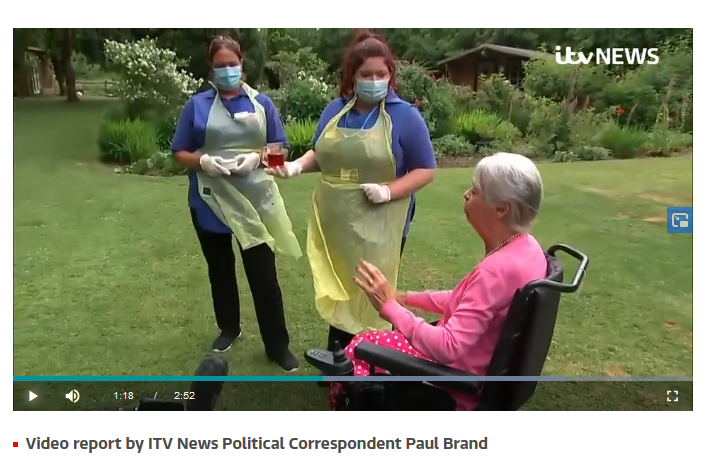Latest News from Everycare
“EVERYCARE IS MY EVERYTHING” …. a quote from a service user at our East Surrey branch when interviewed by ITV yesterday.
Whilst the quote wasn’t actually broadcast the client confirmed in the report how much she appreciated the Everycare support stating “Please don’t say they are never going to come”. It is heartening to know in such difficult times we are still here making a difference to the lives of so many.
 Gill worked really hard with her team and spent over three hours filming yesterday, so it was naturally a little disappointing that they showed so little of the piece. None the less there has already been positive feedback to the Everycare office this morning as people recognized the team.
Gill worked really hard with her team and spent over three hours filming yesterday, so it was naturally a little disappointing that they showed so little of the piece. None the less there has already been positive feedback to the Everycare office this morning as people recognized the team.
Gill said she didn’t want to be personally famous but she did want Everycare to be famous. Isn’t that just the unique team spirit of Everycare!
Little by little the service users that decided to cancel care because of the perceived risks of having contact with care staff are returning. The strain and pressure on relatives and friends is starting to show and some just can not cope any longer without help.
Although the risks of contracting Covid 19 in care homes has been much publicised the actual incidence of the illness in users of community care services has been extremely low.
We are very confident that all our service users can rely on our extreme diligence in taking every possible precaution when delivering any form of care and can be confident that our help is only a phone call away if we are needed.
Allied Healthcare at risk of collapse leaving thousands of elderly people on alert.
Allied Healthcare could cease to operate at the end of the month, the Care Quality Commission has said and there is a ‘credible risk’ services could be disrupted.
Thousands of elderly people were put on alert yesterday amid warnings one of the country’s leading care firms is at risk of collapse.
The Care Quality Commission sounded the alarm after saying Allied Healthcare could cease to operate at the end of this month.
It said there was a “credible risk” that services could be “disrupted” if the company collapsed. Allied Heathcare provides home care – help with washing, feeding and dressing – for 9,300 people in 84 councils across England. The company, which has been struggling with debts, employs 8,000 people. Councils have a duty by law to continue to provide care if a private firm goes bust.
For more on this story visit the Daily Mirror Website.

Everycare home care and live in care services can enable people to stay at home during the most challenging period of their lives.
Doctors are being encouraged to discuss people’s end of life choices much earlier with them and part of this discussion will involve where and how people spend their final days.
Doctors need to get better at having difficult conversations with dying patients and not just in their final days, according to a report from the Royal College of Physicians.
It says doctors should talk to people who could die within 12 months, who may be frail or terminally ill, and give them choices over their future care. But the report says that rarely happens and doctors should be more proactive.It recommends involving family, friends and carers in the conversation too.
The report, Talking about dying, gathered the views of patients, trainees and doctors on how to begin conversations about the end of someone’s life. To read more about this story visit the BBC website.
To find out more about Everycare home care and live in care services and how they can help you stay at home.
 People with dementia are being given the opportunity to lead and manage research into the disease, with the help of £700,000 from the National Lottery.
People with dementia are being given the opportunity to lead and manage research into the disease, with the help of £700,000 from the National Lottery.
The ground-breaking new project Dementia Enquirers will give people with dementia the chance to undertake their own research into the condition, rather than just being participants. The project will work with DEEP, a UK-wide network of more than a hundred community groups and Innovations in Dementia. They will be able to identify research priorities and plan and carry out their own research.
It envisages using university researchers as advisors or with specified roles within the projects. People involved in DEEP will be supported and trained to capture and share their findings in a creative way such as through film, music, poetry and photography.
Rachael Litherland, director of Innovations in Dementia, said: “We are so proud to have been awarded this National Lottery grant, and excited to be undertaking such ground-breaking work. We are confident that the project can influence the prevailing approaches in research – while bringing new respect for the skills, expertise and resilience of those who are living with dementia.”
Joe Ferns, UK funding director at the Big Lottery Fund, said: “We’re delighted to be funding this project, which puts people with experience of living with dementia at the heart of research into the condition. Thanks to National Lottery players, this important issue is being tackled in a way which helps people to feel more in control of their lives.”
For more information visit the Homecare website
 Gill worked really hard with her team and spent over three hours filming yesterday, so it was naturally a little disappointing that they showed so little of the piece. None the less there has already been positive feedback to the Everycare office this morning as people recognized the team.
Gill worked really hard with her team and spent over three hours filming yesterday, so it was naturally a little disappointing that they showed so little of the piece. None the less there has already been positive feedback to the Everycare office this morning as people recognized the team.


